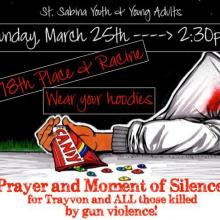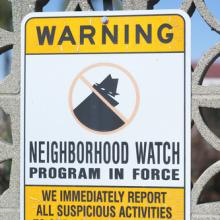sanford florida
Florida’s “stand your ground” law — a source of collective ire at present — is an iteration of the Good Samaritan Laws that exist in this country: laws that offer protection from lawsuits for those who help or protect their neighbors. If you dig a hole to save a child’s life, that child’s family can’t sue you for damage to their lawn. Sounds like a good thing, right? Sounds like the spirit of these laws comes directly from the Bible.
Neighborhood Watch programs are born from the same spirit: they empower those who want to protect their neighbor with the authority to do so. George Zimmerman was allowed to have a gun so that he could be a Good Samaritan.
The problem with Neighborhood Watch programs and stand your ground laws is that, in their rush to be the Samaritan in the story, they never ask the question the lawyer asks in Luke 10: “Who is my neighbor?”

Image via The Faith Community of St. Sabina, www.stsabina.org.
Christians and other people of good faith nationwide stood in solidarity with Trayvon Martin this weekend by wearing hooded sweartshirts — aka "hoodies"— to church.
Monday marks the one-month anniversary of Trayvon's slaying in Sanford, Florida at the hands of neighborhood "watchman" Gregory Zimmerman, who shot and killed the 17-year-old African-American boy in “self defense” for “looking suspicious” while dressed in a hooded sweatshirt.
Trayvon was unarmed, carrying only a package of Skittles, an iced tea and his cell phone.
Last week, people across the nation began wearing hoodies to work, school, and community marches in response to Trayvon's slaying and the injustice of the kind of racial profiling that it would appear directly led to it. On Sunday, many churches took that vision a step further as pastors and congregants donned hoodies and wore them to church for what some congregations called "Hoodie Sunday."
